Unit Test (Solutions): The French Revolution | Social Studies (SST) Class 9 PDF Download
Time: 1 hour
M.M. 30
Attempt all questions.
- Question numbers 1 to 5 carry 1 mark each.
- Question numbers 6 to 8 carry 2 marks each.
- Question numbers 9 to 11 carry 3 marks each.
- Question numbers 12 & 13 carry 5 marks each.
Q1: Which event is considered the starting point of the French Revolution?
(i) The storming of the Bastille
(ii) The American Revolution
(iii) The signing of the Treaty of Versailles
(iv) The Russian Revolution
Ans: (i) The storming of the Bastille
The storming of the Bastille on July 14, 1789, is widely recognized as the beginning of the French Revolution. This event symbolized the end of the king's absolute power and the rise of the people's will.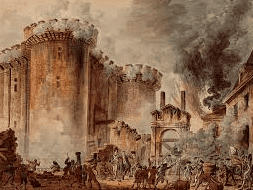 The storming of the Bastille
The storming of the Bastille
Q2: The society of estates in France was part of the __________ system.
Ans: Feudal
The society of estates in France was a characteristic of the feudal system, where society was divided into three estates: the clergy, the nobility, and the commoners.
Q3: The third estate in France was primarily made up of which group?
(i) Nobility
(ii) Clergy
(iii) Commoners
(iv) Monarchy
Ans: (iii) Commoners
The third estate comprised the majority of the French population, including peasants, artisans, and the bourgeoisie (middle class). They had little political power compared to the first (clergy) and second (nobility) estates.
Q4: The Declaration of the Rights of Man and Citizen was primarily concerned with which principle?
(i) Divine right of kings
(ii) Hereditary privileges
(iii) Equality before the law
(iv) Colonial expansion
Ans: (iii) Equality before the law
The Declaration of the Rights of Man and Citizen was a key document from the French Revolution that asserted that all men are equal before the law, a revolutionary concept at the time.
Q5: The National Assembly was formed primarily by representatives of which estate?
Ans: Third Estate
The National Assembly was formed by representatives of the Third Estate when they broke away from the Estates General in protest against the unequal voting system and demanded a fair representation of the people.
Q6: Explain the significance of the Declaration of the Rights of Man and Citizen in the context of the French Revolution.
Ans: i) The Declaration of the Rights of Man and Citizen was a fundamental document of the French Revolution, passed in August 1789. It established the principles of liberty, equality, and fraternity, proclaiming that all men are born free and equal in rights.
ii) It laid the foundation for a new society where the law was to be an expression of the general will, and every citizen was equal before it. This document was significant because it marked the end of the feudal system and the beginning of a democratic governance structure.
Q7: What were the main causes of the financial crisis in France before the revolution?
Ans: i) France’s involvement in the Seven Years' War and the support of the American colonies in their fight against Britain added significantly to the national debt, exacerbating the financial crisis.
ii) Additionally, the cost of maintaining the extravagant court at Versailles further depleted the resources. The unequal tax system, where the Third Estate bore the burden while the First and Second Estates were exempt, compounded the crisis, leading to widespread discontent and the eventual revolution.
Q8: Describe the role of women in the French Revolution.
Ans: i) Women played a crucial role in the French Revolution. They were actively involved in political clubs, protests, and even in storming the Bastille.
ii) They demanded equal rights, including the right to vote and the right to education. Notably, figures like Olympe de Gouges wrote the Declaration of the Rights of Woman and the Female Citizen, advocating for women's rights. 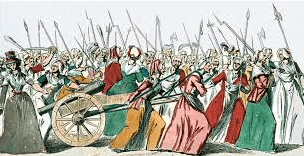 Role of women in French Revolution
Role of women in French Revolution
Q9: How did the social structure of France contribute to the outbreak of the French Revolution?
Ans: i) The social structure of France was divided into three estates: the clergy (First Estate), the nobility (Second Estate), and the commoners (Third Estate).
ii) The First and Second Estates enjoyed privileges, including exemption from most taxes. The Third Estate, which constituted the majority of the population, bore the tax burden.
iii) This unfair system led to widespread dissatisfaction among the commoners. The financial crisis worsened, increasing the frustration of the Third Estate.
iv) The Third Estate's frustration with their lack of political power and economic hardship fueled the revolutionary fervor.This eventually led to the outbreak of the revolution.
Q10: Discuss the Reign of Terror and its impact on the French Revolution.
Ans: i) The Reign of Terror (1793-1794) was a period during the French Revolution characterized by extreme measures taken by the revolutionary government, led by Maximilien Robespierre, to eliminate perceived enemies of the revolution.
ii) Thousands were executed by guillotine, including King Louis XVI and Marie Antoinette.
iii) The Reign of Terror instilled fear across France and solidified the power of the revolutionary government.
iv) However, it also led to internal conflicts and the eventual fall of Robespierre, marking a turning point in the revolution where a more moderate phase began.
Q11: Compare and contrast the estates in pre-revolutionary France in terms of privileges, taxes, and social roles.
Ans: 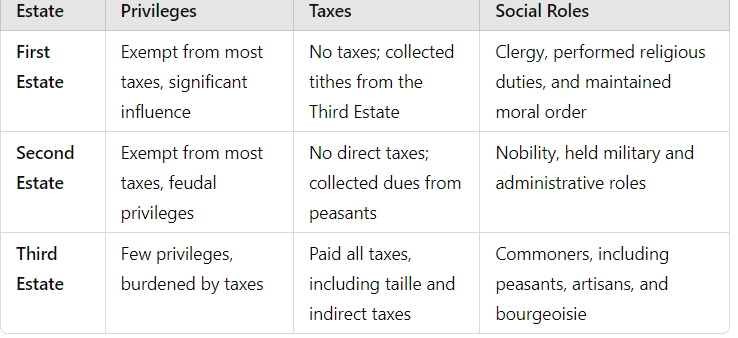
The First and Second Estates enjoyed privileges by birth and wealth, while the Third Estate, despite being the majority, was subjected to heavy taxation and had little political power, leading to widespread discontent and the eventual revolution.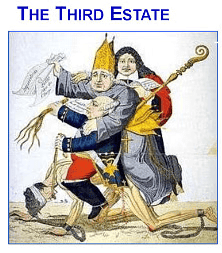
Q12: Explain the role of the Enlightenment thinkers in shaping the ideas that fueled the French Revolution.
Ans: i) Enlightenment thinkers, such as John Locke, Jean-Jacques Rousseau, and Montesquieu, played a crucial role in shaping the revolutionary ideas that fueled the French Revolution.
ii) John Locke’s ideas of natural rights, including life, liberty, and property, influenced the revolutionaries’ demand for equal rights.
iii) Rousseau’s concept of the social contract argued that government should be based on the general will of the people, not on the divine right of kings.
iv) Montesquieu’s advocacy for the separation of powers influenced the structure of the new French government, where power was divided among the legislative, executive, and judiciary branches.
v) These ideas collectively challenged the existing feudal and monarchical systems, promoting ideals of liberty, equality, and fraternity, which became the foundation of the French Revolution.
Q13: Discuss the economic, social, and political conditions in France before the revolution and how they contributed to the revolutionary movement.
Ans: i) Before the French Revolution, France faced severe economic, social, and political problems.The country was in a dire state due to massive debts from wars and the extravagant spending of the monarchy.
ii) The financial crisis was exacerbated by a regressive tax system, burdening primarily the Third Estate. The First and Second Estates enjoyed tax exemptions. Socially, the division of society into rigid estates led to widespread inequality and resentment.
iii) The Third Estate, the majority, had little political power and suffered from poverty and hunger. Bread prices soared due to poor harvests, impacting the Third Estate significantly.
iv) Politically, King Louis XVI’s weak leadership and inability to implement reforms further alienated the populace. The calling of the Estates-General in 1789 was pivotal when the Third Estate’s demands for fair representation were ignored.
v) This situation became the catalyst for the revolution, leading to the collapse of the Old Regime. The revolutionary movement was ignited by economic hardships, social injustices, and political failures. These factors led to the rise of a new order based on the principles of liberty, equality, and fraternity.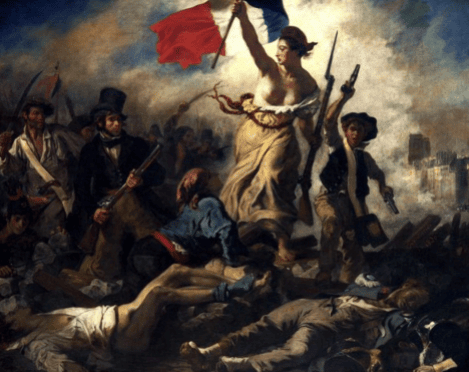 The French Revolution
The French Revolution
|
55 videos|637 docs|79 tests
|
FAQs on Unit Test (Solutions): The French Revolution - Social Studies (SST) Class 9
| 1. Quelles sont les causes principales de la Révolution française ? |  |
| 2. Quelles furent les conséquences de la Révolution française ? |  |
| 3. Qui étaient les principaux acteurs de la Révolution française ? |  |
| 4. Quelle est l'importance de la Déclaration des droits de l'homme et du citoyen ? |  |
| 5. Comment la Révolution française a-t-elle influencé l'Europe et le monde ? |  |






















